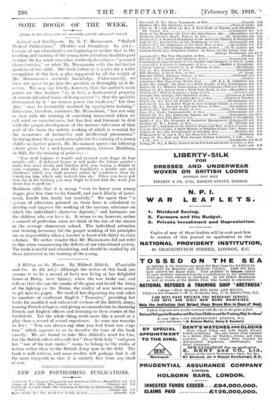SOME BOOKS OF THE WEEK.
IYaiice in (his calioas da,s not necssrtrily metals inemegamt reeis:e.] Instruct and Intelligence. By N. C. Maenamara.- "Oxford Medical Publications." (Hodder and Stoughton. 6s. net.)—
Certain of our educationists arc beginning to realize that in the teaching and training of the young more attention should be paid • to what the lay mind somewhat carelessly describes as "personal
characteristics," or what Mr. Maenamara calls the instinctive qualities of the child. The book before us in a plea for a wider recognition of this fact, a plea supported by all the weight of. Mr. Macnamara's scientific knowledge. Unfortunately, wo have not space to go into the question as thoroughly as it de- serves. Wo may say briefly, however, that the author's main points are that instinct " is, in fact, a fundamental property
of certain inherited forms of living matter" ; that the qualities determined by it " no human power can eradicate," but that they " may be favourably modified by appropriate training."
Education, thezefore, continues Mr. Maenamara, " has not only to deal with the training of something immaterial which we call mind or consciousness, but has first and foremost to deal with the proper development of the nervous substance of that part of the brain the orderly working of which is essential for I ho occurrence of instinctive and intellectual phenomena." In laying clown the general principles for the training of a young child's instinctive powers, Mr. Maenamara quotes the following advice given by a well-known sportsman, aervase Markham, in 1621, for the training of pointers :---
" You shall beginne to handle and instruct your dogge at four months old ; if deferred longer it will make the labour greater ; make him most loving and familiar with you, taking a delight in your company; also mix with this familiarity a kindly awe and obedience which you shall procure rather by tenderness than by terrefieing him, which only maketh him sly. When you have got hus far in his training you may begin to teach him the work you desire him to perferm."
Markham adds that it is wrong " ever to hurry your young dogge, give him time to fix himself, and much liberty of move- ment, handle him firmly but tenderly." We agree that " a - system of education pursued on these lines is calculated to. - develop and improve the working of the nervous substance on which the individual's character depends," and fortunate are the children, who can have it. It seems to us, however, rather - counsel of perfection when we think of the size of the classes • in the average elementary school. The individual attention - and training necessary for the proper working of his principles are an impossibility when a teacher is faced with thirty to sixty scholars. We rather -slender that Mr. Maanaihara did not refer to this when enumerating the defects of our educational system.
• The book is useftil and stimulating, and should be studied by all those interested in the training of the young.


































 Previous page
Previous page